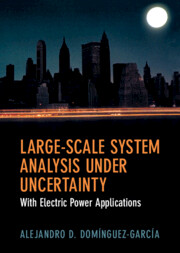Refine search
Actions for selected content:
997 results in Applied probability and stochastic networks
9 - Continuous-Time Systems: Set-Theoretic Input Uncertainty
-
- Book:
- Large-Scale System Analysis Under Uncertainty
- Published online:
- 17 January 2022
- Print publication:
- 17 February 2022, pp 273-306
-
- Chapter
- Export citation
Index
-
- Book:
- Large-Scale System Analysis Under Uncertainty
- Published online:
- 17 January 2022
- Print publication:
- 17 February 2022, pp 334-338
-
- Chapter
- Export citation
7 - Static Systems: Set-Theoretic Input Uncertainty
-
- Book:
- Large-Scale System Analysis Under Uncertainty
- Published online:
- 17 January 2022
- Print publication:
- 17 February 2022, pp 202-236
-
- Chapter
- Export citation
6 - Continuous-Time Systems: Probabilistic Input Uncertainty
-
- Book:
- Large-Scale System Analysis Under Uncertainty
- Published online:
- 17 January 2022
- Print publication:
- 17 February 2022, pp 166-201
-
- Chapter
- Export citation
1 - Introduction
-
- Book:
- Large-Scale System Analysis Under Uncertainty
- Published online:
- 17 January 2022
- Print publication:
- 17 February 2022, pp 1-15
-
- Chapter
- Export citation
Dedication
-
- Book:
- Large-Scale System Analysis Under Uncertainty
- Published online:
- 17 January 2022
- Print publication:
- 17 February 2022, pp v-vi
-
- Chapter
- Export citation
4 - Static Systems: Probabilistic Structural Uncertainty
-
- Book:
- Large-Scale System Analysis Under Uncertainty
- Published online:
- 17 January 2022
- Print publication:
- 17 February 2022, pp 91-129
-
- Chapter
- Export citation
5 - Discrete-Time Systems: Probabilistic Input Uncertainty
-
- Book:
- Large-Scale System Analysis Under Uncertainty
- Published online:
- 17 January 2022
- Print publication:
- 17 February 2022, pp 130-165
-
- Chapter
- Export citation
Contents
-
- Book:
- Large-Scale System Analysis Under Uncertainty
- Published online:
- 17 January 2022
- Print publication:
- 17 February 2022, pp vii-x
-
- Chapter
- Export citation
References
-
- Book:
- Large-Scale System Analysis Under Uncertainty
- Published online:
- 17 January 2022
- Print publication:
- 17 February 2022, pp 330-333
-
- Chapter
- Export citation

Large-Scale System Analysis Under Uncertainty
- With Electric Power Applications
-
- Published online:
- 17 January 2022
- Print publication:
- 17 February 2022
20 - Many Servers with Abandonment
- from Part VI - Many-Server Systems
-
- Book:
- Scheduling and Control of Queueing Networks
- Published online:
- 01 October 2021
- Print publication:
- 14 October 2021, pp 346-359
-
- Chapter
- Export citation
12 - Processing Networks and Maximum Pressure Policies
- from Part IV - Fluid Models of Multi-Class Queueing
-
- Book:
- Scheduling and Control of Queueing Networks
- Published online:
- 01 October 2021
- Print publication:
- 14 October 2021, pp 197-218
-
- Chapter
- Export citation
4 - The G/G/1 Queue
- from Part II - Approximations of the Single Queue
-
- Book:
- Scheduling and Control of Queueing Networks
- Published online:
- 01 October 2021
- Print publication:
- 14 October 2021, pp 61-70
-
- Chapter
- Export citation
8 - Product-Form Queueing Networks
- from Part III - Queueing Networks
-
- Book:
- Scheduling and Control of Queueing Networks
- Published online:
- 01 October 2021
- Print publication:
- 14 October 2021, pp 125-142
-
- Chapter
- Export citation
18 - Infinite Servers Revisited
- from Part VI - Many-Server Systems
-
- Book:
- Scheduling and Control of Queueing Networks
- Published online:
- 01 October 2021
- Print publication:
- 14 October 2021, pp 323-329
-
- Chapter
- Export citation
Part VI - Many-Server Systems
-
- Book:
- Scheduling and Control of Queueing Networks
- Published online:
- 01 October 2021
- Print publication:
- 14 October 2021, pp 321-322
-
- Chapter
- Export citation
9 - Generalized Jackson Networks
- from Part III - Queueing Networks
-
- Book:
- Scheduling and Control of Queueing Networks
- Published online:
- 01 October 2021
- Print publication:
- 14 October 2021, pp 143-156
-
- Chapter
- Export citation
16 - Control in Balanced Heavy Traffic
- from Part V - Diffusion Scaled Balanced Heavy Traffic
-
- Book:
- Scheduling and Control of Queueing Networks
- Published online:
- 01 October 2021
- Print publication:
- 14 October 2021, pp 270-304
-
- Chapter
- Export citation
22 - Parallel Servers with Skill-Based Routing
- from Part VI - Many-Server Systems
-
- Book:
- Scheduling and Control of Queueing Networks
- Published online:
- 01 October 2021
- Print publication:
- 14 October 2021, pp 385-412
-
- Chapter
- Export citation
